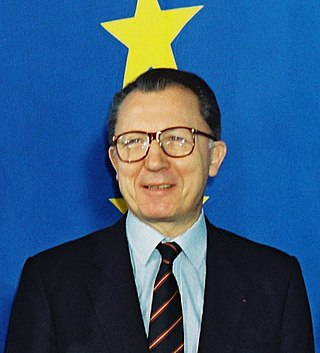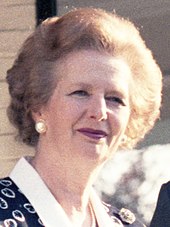
Margaret Hilda Thatcher, Baroness Thatcher, was a British stateswoman and Conservative politician who served as Prime Minister of the United Kingdom from 1979 to 1990 and Leader of the Conservative Party from 1975 to 1990. She was the longest-serving British prime minister of the 20th century and the first woman to hold the position. As prime minister, she implemented economic policies known as Thatcherism. A Soviet journalist dubbed her the "Iron Lady", a nickname that became associated with her uncompromising politics and leadership style.

The European Union is a geo-political entity, created in 1993, covering a large portion of the European continent. It is founded upon numerous treaties and has undergone expansions and secessions that have taken it from six member states to 27, a majority of the states in Europe.

Thatcherism is a form of British conservative ideology named after Conservative Party leader Margaret Thatcher that relates to not just her political platform and particular policies but also her personal character and style of management while in office. Proponents of Thatcherism are referred to as Thatcherites. The term has been used to describe the principles of the British government under Thatcher from the 1979 general election to her resignation in 1990, but it also receives use in describing administrative efforts continuing into the Conservative governments under John Major and David Cameron throughout the 1990s and 2010s. In international terms, Thatcherites have been described as a part of the general socio-economic movement known as neoliberalism, with different countries besides the United Kingdom sharing similar policies around expansionary capitalism.

Norman Stewart Hughson Lamont, Baron Lamont of Lerwick, is a British politician and former Conservative MP for Kingston-upon-Thames. He served as Chancellor of the Exchequer from 1990 until 1993. He was created a life peer in 1998. Lamont was a supporter of the Eurosceptic organisation Leave Means Leave.

Richard Edward Geoffrey Howe, Baron Howe of Aberavon,, known from 1970 to 1992 as Sir Geoffrey Howe, was a British politician who served as Deputy Prime Minister of the United Kingdom from 1989 to 1990. A member of the Conservative Party, he was Margaret Thatcher's longest-serving Cabinet minister, successively holding the posts of chancellor of the Exchequer, foreign secretary, and finally leader of the House of Commons, deputy prime minister and lord president of the Council. His resignation on 1 November 1990 is widely considered to have precipitated the leadership challenge that led to Thatcher's resignation three weeks later.
The Bruges Group is a think tank based in the United Kingdom. Founded in 1989, it advocates for a restructuring of Britain's relationship with the European Union and other European countries. Its members and staff campaign against the notion of an "ever-closer union" in Europe and, above all, against British involvement in a single European state. The group is often associated with the Conservative Party, including MPs such as Iain Duncan Smith, Daniel Hannan, John Redwood, and Norman Lamont. However, it is formally an independent all-party think tank, and some Labour MPs and peers have cited the publications or attended the meetings of the Bruges Group through the years, such as Frank Field, Gisela Stuart, Lord Stoddart of Swindon and Lord Shore of Stepney.

The Single European Act (SEA) was the first major revision of the 1957 Treaty of Rome. The Act set the European Community an objective of establishing a single market by 31 December 1992, and a forerunner of the European Union's Common Foreign and Security Policy (CFSP) it helped codify European Political Co-operation. The amending treaty was signed at Luxembourg City on 17 February 1986 and at The Hague on 28 February 1986. It came into effect on 1 July 1987, under the Delors Commission.
The European Monetary System (EMS) was a multilateral adjustable exchange rate agreement in which most of the nations of the European Economic Community (EEC) linked their currencies to prevent large fluctuations in relative value. It was initiated in 1979 under then President of the European Commission Roy Jenkins as an agreement among the Member States of the EEC to foster monetary policy co-operation among their Central Banks for the purpose of managing inter-community exchange rates and financing exchange market interventions.

Francis Arthur Cockfield, Baron Cockfield, PC, was by turns a civil servant, a company director, a Conservative Party politician, and a European Commissioner. He served as Minister of State at the Treasury from 1979 to 1982, as Secretary of State for Trade from 1982 until 1983, as Chancellor of the Duchy of Lancaster from 1983 until 1984, and a member of the European Commission from 1984 to 1988. He is known as 'The Father of the Single Market'.

The College of Europe is a post-graduate institute of European studies with its first campus opened in Bruges, Belgium, a second campus located in Warsaw, Poland, and a third one established in Tirana, Albania.

The Delors Commission was the administration of Jacques Delors, the eighth President of the European Commission. Delors presided over the European Commission for three terms. The first term lasted from 1985 to 1988, the second until 1992 and the final one until 1994, making Delors the longest serving president, and his Commission is also seen as the most successful at advancing European integration. It was the only Commission to serve three times, and Delors served five two-year terms. The third Commission was the first Commission of the European Union, the Maastricht Treaty having come into force in 1993.
The 1990 Conservative Party leadership election was called on 14 November 1990 following the decision of Michael Heseltine, former defence and environment secretary, to challenge Margaret Thatcher, the incumbent Prime Minister of the United Kingdom, for leadership of the Conservative Party.

Euroscepticism in the United Kingdom is a continuum of belief ranging from the opposition to certain political policies of the European Union to the complete opposition to the United Kingdom’s membership of the European Union. It has been a significant element in the politics of the United Kingdom (UK). A 2009 Eurobarometer survey of EU citizens showed support for membership of the EU was lowest in the United Kingdom, alongside Latvia and Hungary.

The modern political history of the United Kingdom (1979–present) began when Margaret Thatcher gained power in 1979, giving rise to 18 years of Conservative government. Victory in the Falklands War (1982) and the government's strong opposition to trade unions helped lead the Conservative Party to another three terms in government. Thatcher initially pursued monetarist policies and went on to privatise many of Britain's nationalised companies such as British Telecom, British Gas Corporation, British Airways and British Steel Corporation. She kept the National Health Service. The controversial "poll tax" to fund local government was unpopular, and the Conservatives removed Thatcher as Prime Minister in 1990, although Michael Heseltine, the minister who did much to undermine her, did not personally benefit from her being ousted.

Margaret Thatcher's term as the Prime Minister of the United Kingdom began on 4 May 1979 when she accepted an invitation of Queen Elizabeth II to form a government, and ended on 28 November 1990 upon her resignation. She was elected to the position in 1979, having led the Conservative Party since 1975, and won landslide re-elections in 1983 and 1987. She gained intense media attention as Britain's first female prime minister, and was the longest-serving British prime minister of the 20th century. Her premiership ended when she withdrew from the 1990 Conservative leadership election. While serving as prime minister, Thatcher also served as the First Lord of the Treasury, the Minister for the Civil Service and the Leader of the Conservative Party.

The history of the European Union between 1993 and 2004 was the period between its creation and the 2004 enlargement. The European Union was created at the dawn of the post–Cold War era and saw a series of successive treaties laying the ground for the euro, foreign policy and future enlargement. Three new member states joined the previous twelve in this period and the European Economic Area extended the reach of the EU's markets to three more.

Brexit was the withdrawal of the United Kingdom (UK) from the European Union (EU). Following a referendum on 23 June 2016, Brexit officially took place at 23:00 GMT on 31 January 2020. The UK is the only sovereign country to have left the EU. The UK had been a member state of the EU or its predecessor, the European Communities (EC), since 1 January 1973. Following Brexit, EU law and the Court of Justice of the European Union no longer have primacy over British laws. The European Union (Withdrawal) Act 2018 retains relevant EU law as domestic law, which the UK can amend or repeal.

The United Kingdom was a member state of the European Union (EU) and of its predecessor the European Communities (EC) – principally the European Economic Community (EEC) from 1 January 1973 until 31 January 2020. Since the foundation of the EEC, the UK had been an important neighbour and then leading member state, until Brexit ended 47 years of membership. During the UK's time as a member state two referendums were held on the issue of its membership, with the first being held on 5 June 1975, resulting in a vote to stay in the EC, and the second, held on 23 June 2016, which resulted in the vote to leave the EU.

A Question of Europe was a televised debate of the Oxford Union held on 3 June 1975. The debate was held two days before the 1975 referendum, in which the electorate were asked if Britain should remain a member of the European Economic Community (EEC) which it had joined in 1973. The statement debated was "that this House would say yes to Europe". Former prime minister Edward Heath and the leader of the Liberal Party Jeremy Thorpe spoke in favour of the motion and Labour ministers Barbara Castle and Peter Shore spoke against it. Heath judged that the audience were largely in favour of the motion anyway and in the vote after the debate, the statement was approved by 493 votes to 92. The debate was broadcast live on BBC1 with an introduction by Robin Day and Ludovic Kennedy; at the end of the programme David Dimbleby provided an update on other developments in the referendum campaign. The result of the 5 June referendum was 67% in favour of remaining within the EEC.

"No. No. No." was the response of British prime minister Margaret Thatcher to European Commission president Jacques Delors's proposals for European integration at the October 1990 European Council summit meeting in Rome. Her remarks led to the resignation of deputy prime minister Geoffrey Howe and the ensuing Conservative Party leadership election in which Thatcher was ousted.



















